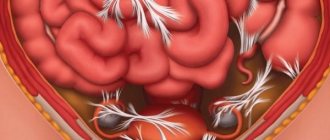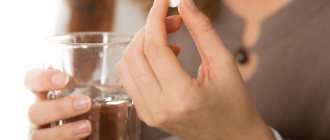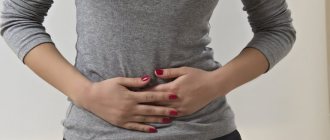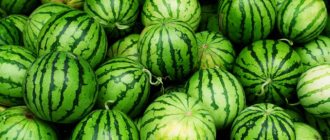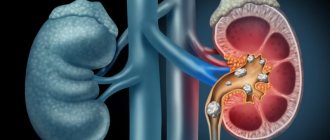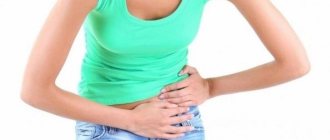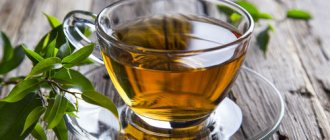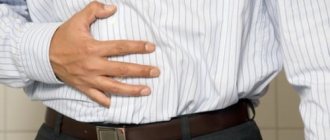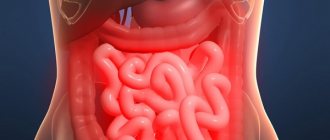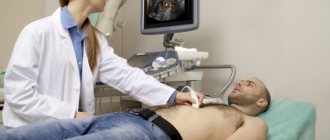Constipation is a pathological condition in which a person is unable to empty his bowels for two days or more. In this case, discomfort is often observed, manifested in the form of pain in the anus or a feeling of incomplete bowel movement.
When a person is healthy, the frequency of bowel movements depends on many factors: diet and daily routine, lifestyle, habits. Sometimes the absence of stool is an absolutely normal physiological process. There are people who are able to go to the toilet no more than 3 times a week, while their general health is excellent. But if such a condition bothers a person, it is necessary to take any measures aimed at treating constipation.
Symptoms of constipation in children and adults
The following symptoms indicate constipation:
- Defecation less than 3 times a week.
- Newborns have stool less than 2 times a day when breastfed, and less than 1 time per day when bottle-fed.
- In children aged 1–5 years, less than 5 times in 7 days.
- Bowel movements in children over 5 years of age
years and older - less than 3 times in 7 days. - Stool looks like small balls or hard lumps.
- The minimum amount of feces is less than 45–50 g.
- The act of defecation is accompanied by long straining and sometimes painful sensations.
Glute bridge for abdominal pain after going to the toilet
Since in some cases discomfort is a consequence of blood stagnation in the pelvic organs, physical activity involving the buttocks, legs and abdominal muscles will be effective.
These exercises include:
- gluteal bridge;
- hip rotation;
- lunges;
- squats;
- lateral bends;
- bike;
- scissors;
- moving the leg back;
- birch;
- cat;
- changing legs in support on hands;
- Kegel exercises.
Regular implementation can help cope with existing complaints (in combination with recommendations prescribed by a doctor) or prevent the development of such complaints in the future.
Causes of constipation
Constipation is a problem that can occur at any age. There are quite a few reasons for this, here are the main ones:
- malignant neoplasms in the intestine that block its lumen;
- improper and unbalanced diet;
- diverticula and chronic volvulus;
- lack of the required amount of fluid for the body (minimum 1–1.5 liters per day);
- poisoning with medications and heavy metals (lead or mercury);
- sedentary lifestyle, physical inactivity;
- diseases of the endocrine system (diabetes mellitus, hypothyroid coma, hormonally active adrenal tumor);
- severe stress and long-term psychological trauma;
- postoperative period (cholecystectomy, operations on other organs of the digestive system);
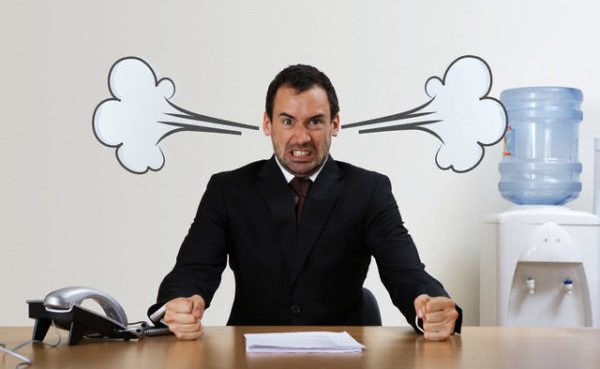
constipation can be caused by stress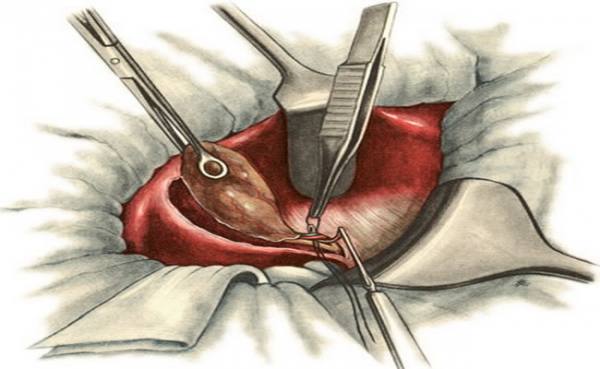
constipation occurs after gallbladder removal
Constipation often occurs in those people who suffer for a long time and postpone going to the toilet until the evening. Over time, the sensitivity of the receptors decreases, and a person may not go to the toilet for a long time, and then his anus hurts after a bowel movement.
Infants and pregnant women may also suffer from constipation. In babies, this can be caused by an incorrectly selected formula or poor nutrition of the mother, if we are talking about breastfeeding. During pregnancy, this problem often arises. This is due to the fact that the fetus puts pressure on organs close to the uterus and blocks the normal movement of feces through the intestines; there is also a lack of stool due to hormonal changes (progesterone levels increase).
Course of therapy
Pain after bowel movements is often a consequence of irritable bowel syndrome. In this case, a spasm appears in the lower abdomen and on the left, and cold sweat may appear on the skin.
It is worth noting that with the syndrome the spasm is very strong, it begins to radiate to the lumbar region, and it all ends with severe diarrhea. Only a doctor can treat irritable bowel syndrome. Chronic digestive disorders can be triggered by various reasons, including stress, poor environment, and poor nutrition.
To get rid of the syndrome, you need complex therapy:
- Take your medications.
- Include nutritional supplements in your menu.
- Psychological relaxation is required.
- Follow a diet with cellulose and a high amount of pectin.
With the help of complex therapy, you will completely get rid of abdominal pain after a bowel movement, because diet alone, taking painkillers or cleansing is not enough. Here we need to take this issue seriously.
Causes of pain during bowel movements
The etiology of constipation is clear. But why does pain occur in the anus during bowel movements? This discomfort occurs as a result of the following factors:
- Anal fissure or rupture
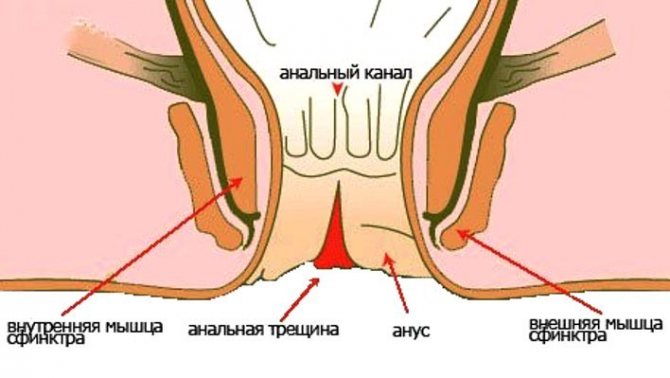
anus. This often happens when passing too hard stool, which simply injures the mucous membrane of the rectum. Another cause of rectal injury can be foreign objects that were accidentally swallowed (toy parts, paper clips, pins, etc.). - Rectal cancer. This disease is insidious in that it may not manifest itself in any way for a long time, and when the symptoms become noticeable, drug treatment becomes almost impossible. In addition to constipation and painful bowel movements, rectal cancer is often accompanied by bleeding and discomfort, radiating to the groin, thighs and abdomen.
- Infectious diseases of the reproductive system. Quite often it happens that with venereal diseases, not only the reproductive system suffers, but also nearby organs, in particular the rectum. Due to an acute inflammatory process in the anal mucosa, severe pain occurs during bowel movements.
- Perineal injury. As a result of the blow, a strong contraction of the smooth muscles of the internal organs occurs, which can result in constipation and pain during bowel movements.
After constipation, pain in the anus, treatment at home
Painful sensations during the process of bowel movement make a person panic, especially if there is a periodic occurrence of discomfort.
Therefore, we will further find out why pain occurs after defecation in the anus, how to treat and prevent such a pathological phenomenon.
Pain in the anus during defecation can be caused by a variety of reasons, most of which are associated with pathological processes in the intestine itself.
Reference . The lower intestine contains many blood vessels and nerve endings, so irritation and injury to the rectal mucosa causes severe pain.
Common causes of anxiety symptoms during and after bowel movements are hemorrhoids and anal fissures.
It is hemorrhoids that in most cases cause pain in the anal area.
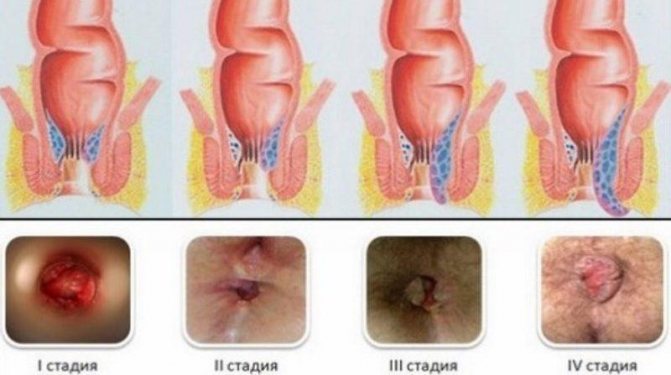
Due to a sedentary lifestyle and frequent constipation, blood stagnation occurs in the pelvic area, and the vessels of the rectum, unable to withstand the pressure, begin to stretch.
In particular, hemorrhoidal veins are affected, which, when deformed, block the anal lumen. Due to such pathological processes, excretion of feces occurs with difficulty, and a person experiences pain in the anus after bowel movement, as well as during this process.
Reference. Pain in hemorrhoids manifests itself from the 2nd stage of the disease.
Another common factor that causes discomfort is anal fissure. This disease is characterized by damage to the mucous membrane of the anal canal.
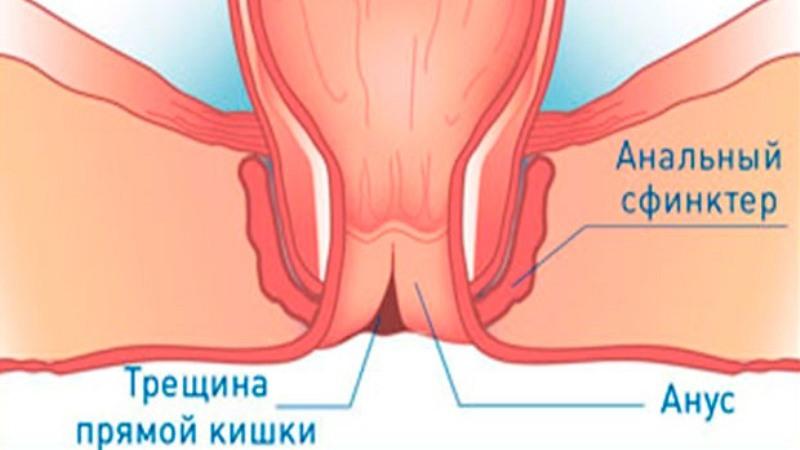
The pain is strong, sharp, but short-lived. They are felt both during defecation and after. Mostly, a painful attack lasts about 20 minutes.
Important! If left untreated, anal fissures become chronic and can lead to complications in the form of abscesses and inflammatory lesions.
In addition, discomfort after defecation may indicate the development of the following pathological conditions:
- paraproctitis (an inflammatory process that results in the formation of an abscess);
- proctitis (inflammation of the rectal mucosa);
- sphincteritis (inflammatory damage to the anal sphincter);
- fistula;
- cryptitis (inflammatory lesion of the sinuses (crypts) of the anus);
- chronic intestinal inflammation;
- irritable bowel syndrome;
- oncology;
- anal eczema;
- rectal prolapse;
- narrowing of the anal canal after surgery;
- venereal diseases;
- traumatization.
You may also experience pain in the anus after constipation or diarrhea.
Pain during constipation is explained by mechanical damage to the mucous membrane from dense and hard feces, as well as excessive straining during bowel movements.
If it hurts in the anus after diarrhea , then this may be due to irritation of the mucous membrane and delicate skin in the anus. Here it is imperative to find out and eliminate the cause of diarrhea, and only then begin treatment of the inflamed area.
Discomfort can be a manifestation of various ailments . Each disease and stage of its progression is characterized by certain painful sensations.
Soreness can be sharp and sudden, which indicates an acute stage of the disease, or vice versa - aching and inexpressive, which indicates a chronic type of pathology.
Reference. Certain characteristics of painful sensations will help the specialist make a preliminary diagnosis.
Therefore, the doctor first interviews the patient, finding out the following characteristics of the pain felt:
- Intensity.
- Periodicity.
- The nature of the pain (sharp, dull, aching, shooting, pressing).
- Connection with the emotional state (presence of stress, worries).
- Connection with bowel movement (presence of pain in the anus after defecation or during the process).
- Does the pain disappear after using painkillers?
Based on the information received and the visual examination performed, the doctor prescribes further examination to confirm the preliminary diagnosis.
The examination is usually carried out using various diagnostic methods : taking a rectal smear, general blood test, rectoscopy, colonoscopy.
If there is pain in the anus after using the toilet, then this circumstance in any case requires finding out the cause and taking appropriate measures to eliminate it.
However, there are situations when immediate consultation with a specialist is necessary.
Indications for a mandatory and prompt visit to a medical facility are:
- increased body temperature;
- the appearance of swelling in the anus;
- the appearance of bloody discharge from the rectum;
- rectal bleeding, which may cause dizziness and weakness.
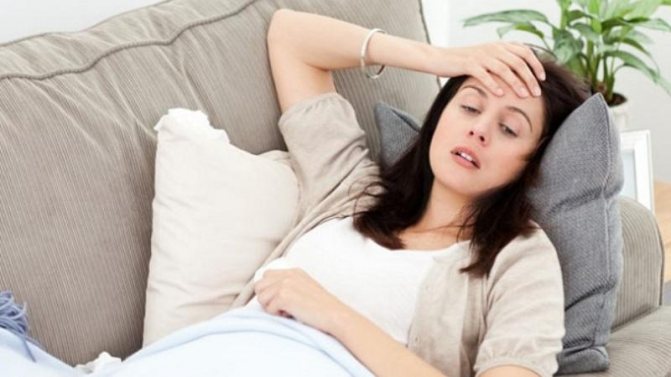
You also need to plan a trip to the doctor if pain in the anus after stool is felt for several days.
Before consultation, it is allowed to use over-the-counter medications to alleviate the condition, but you should not get carried away with them, so as not to blur the clinical picture of the pathological phenomenon.
It may happen that pain in the anus during bowel movements can occur in an absolutely healthy person.
The causes of discomfort in such situations are:
- Maintaining a sedentary lifestyle.
- Sedentary work.
- Prolonged sitting on a hard chair.
- Spasms of the muscles located next to the anus.
In such situations, a person just needs to adjust his lifestyle, for which he needs to lead an active lifestyle, exercise daily and take breaks while working.
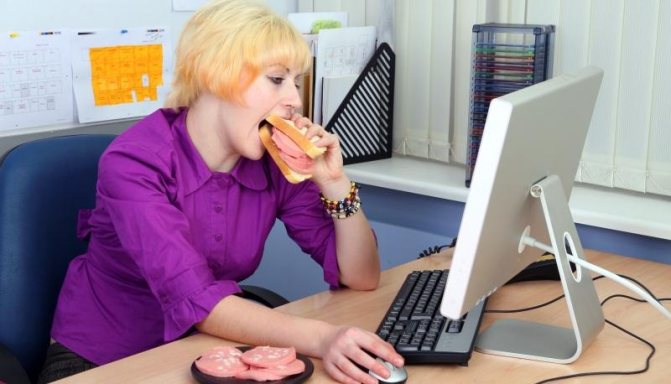
Another commonplace reason for the appearance of unpleasant symptoms is poor nutrition, which causes various stomach disorders.
Consumption of large quantities of food, unhealthy foods and low quality products leads to the fact that food is poorly digested. As a result, pain in the anus may occur during bowel movements.
A similar situation is quite often observed if a person does not monitor his diet and consumes a large amount of spicy, fatty foods.
Fixing the problem is very simple. You need to establish a healthy and nutritious diet by including vegetables, fruits, cereals, and dairy products in your diet.
After all the examinations have been carried out and an accurate diagnosis has been made, the specialist prescribes adequate treatment.
Reference. Depending on the type of pathology, conservative or surgical therapy may be prescribed.
Conservative treatment consists of selecting a set of medications that effectively eliminate inflammation and pain. The most commonly prescribed groups of drugs are:
- painkillers (“Ketorol”, “Nise”) - to relieve pain and improve general condition;
- rectal suppositories (“Relief”, “Proctosan”) - effectively cope with symptoms. Used for cracks and internal hemorrhoids;
- ointments (“Proctosedyl”, “Hepatrombin G”) - used for external hemorrhoids;
- venotonics (“Venarus”, “Detralex”) - often prescribed to strengthen and tone venous vessels;
- hemostatic drugs (Vikasol) - used for severe bleeding.
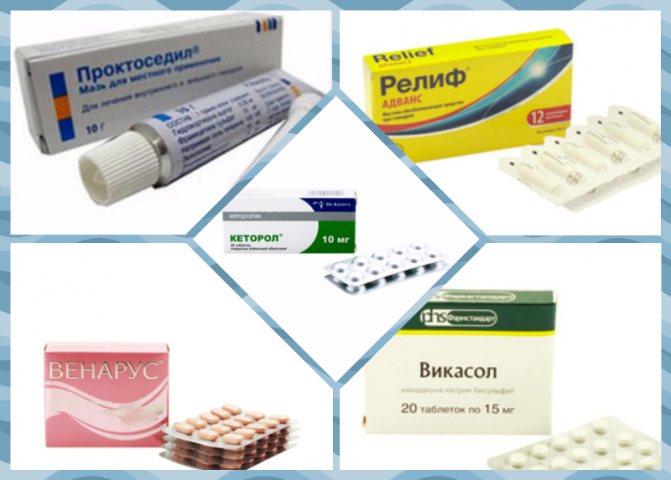
If the anus hurts after constipation, then the doctor recommends following a diet designed to improve digestion and the process of bowel movement.
If the diet does not have the desired effect, then laxatives are prescribed (Bisacodyl, Senadexin, Guttalax, Microlax).
If the anus hurts after diarrhea, then first of all it is necessary to stop the diarrhea with the help of special medications (Smecta, Loperamide). Since diarrhea is a disorder of the digestive system caused by food, infections or stressful situations, further treatment depends on the provoking factor.
In cases of ineffectiveness of conservative methods, specialists resort to surgical intervention.
As usual, pain in the anus after defecation is treated through surgery in the following situations:
- Paraproctitis.
- Fistula.
- Anal fissures, if medications are ineffective.
- Thrombosis of hemorrhoids.
- Rectal prolapse.
The surgery itself does not take much time, but the recovery period can last quite a long time.
Therefore, treatment should be started as early as possible, because this way you can prevent the progression of pathology and the development of complications.
If the anus hurts after using the toilet, this may indicate both an unhealthy lifestyle (poor diet, insufficient physical activity) and the development of certain pathological processes.
In this regard, preventive measures are aimed at correcting lifestyle, preventing diseases and consist of the following:
- proper and rational nutrition;
- sufficient consumption of clean drinking water (at least 2 liters per day);
- refusal to use toilet paper with fragrances and dyes, as this can be an additional source of irritation;
- compliance with the rules of personal hygiene for the intimate area;
- Exercise is also very important for normal bowel function, but you should avoid exercises that put stress on the muscles in the anus. It is better to choose swimming or tennis.
To prevent diseases, you should regularly visit a proctologist. This is especially true if there is a predisposition or even minor discomfort, for example, pain in the anus with diarrhea or constipation.
Pain during bowel movements can be directly related to very serious diseases, so this problem should not be ignored.
If the sphincter hurts after diarrhea or constipation, this may indicate pathological processes developing directly in the rectum. Therefore, the sooner treatment is started, the higher the likelihood of a successful outcome.
source
An anal fissure (anal fissure) is a tear in the mucous membrane of the large intestine, often located near the anus. Many people do not pay attention to such minor damage, believing that it cannot pose serious harm to the body. But this opinion is erroneous, since any damage to the skin and mucous membranes opens free access to the body for all kinds of pathogenic microorganisms.
In this article you will learn the causes and symptoms of anal fissures, how to treat fissures in the anus at home and with what means.
The most common cause of this disorder is frequent constipation and hemorrhoids. With constipation, the intestinal walls are forced to stretch, the pressure on them increases, which often leads to ruptures of the mucous membranes. With hemorrhoids, a person is forced to strain very hard during bowel movements, which also increases pressure in the rectum and can lead to rupture of the mucous membrane.
The causes of anal fissure can be considered:
- All kinds of diets that completely exclude the consumption of foods containing fat, which are promoted almost everywhere today.
- Various mechanical injuries that appear when too dense stool passes through the intestines or during a rectal examination using medical instruments.
- Difficult childbirth , requiring very serious efforts from the woman for a long time.
- Presence of condylomas of the anus.
- Anal sex.
- Maintaining a sedentary lifestyle.
- Sedentary work.
- Presence of sphincter spasms.
- Poor blood circulation in the mucous membrane of the rectum.
- Diseases such as tuberculosis, AIDS, HIV, syphilis.
The main symptom of such a disorder can be called the appearance of sharp and quite severe pain during normal bowel movements, after which the pain persists for quite a long time, on average about one hour, causing quite serious discomfort to the person.
At the same time, the characteristics of pain and its intensity change. When defecating, a strong and sharp pain appears , but after the end of the act of defecation it becomes less pronounced, dull and acquires a pulsating character.
If there is a crack of sufficiently large size and depth after a bowel movement on the toilet paper, you can find a small amount of scarlet blood. If, every time you visit the toilet to defecate, the amount of blood released increases, and the pain becomes stronger and persists for a very long time, then you should consult a doctor immediately.
Anal fissures are treated by a proctologist, and at the initial stage of the disorder, in most cases, treatment with conservative methods and at home is sufficient for patients. When the condition is advanced, surgery is often required.
Small anal fissures that have appeared relatively recently can be cured with conservative therapy at home, which is carried out gradually and necessarily comprehensively, including many drugs and procedures.
If the patient experiences severe pain, then he is prescribed painkillers that also have an antispasmodic effect, for example, No-shpa or its domestic analogue - Drotaverine. In addition, anti-inflammatory drugs and drugs that accelerate wound healing and tissue regeneration are often prescribed.
Among the internal medications, it should be noted a variety of laxatives , which in most cases form an important part of the treatment, since they provide unloading of the intestines and easier bowel movements. The use of laxatives at home allows you to speed up the healing process of cracks in the anus naturally, preventing secondary rupture of the mucous membranes.
An important point is that antibiotic tablets are not prescribed for the treatment of anal fissures. For this purpose, local agents are used, which are more effective and do not have a systemic effect.
Among the means for external use in the treatment of anal fissures at home, pharmaceutical ointments and creams are most often used.
Effective remedies for anal fissures among ointments:
- Levomekol . The ointment is an effective antiseptic that accelerates wound healing processes. In addition, the use of ointment helps eliminate the inflammatory process in the anus and rectum.
- Nitroglycerin ointment . The product is a very effective drug, most often used in the treatment of anal fissures.
- Ultraproct ointment . Its use not only helps to disinfect the existing wound, but also accelerates the healing process, while also providing an analgesic effect.
- Solcoseryl ointment . Its use allows patients to quickly regain good health and at the same time effectively restores damaged mucosal tissue. To obtain the fastest possible results, it is recommended to apply the ointment to a tampon, which is inserted into the rectum.
- Ointment Rescuer . The drug is quite well known because it is very often used to heal wounds of various origins. It is also used to treat anal fissures. Since the product contains natural ingredients, it is often used to treat chronic anal fissures.
similar articles
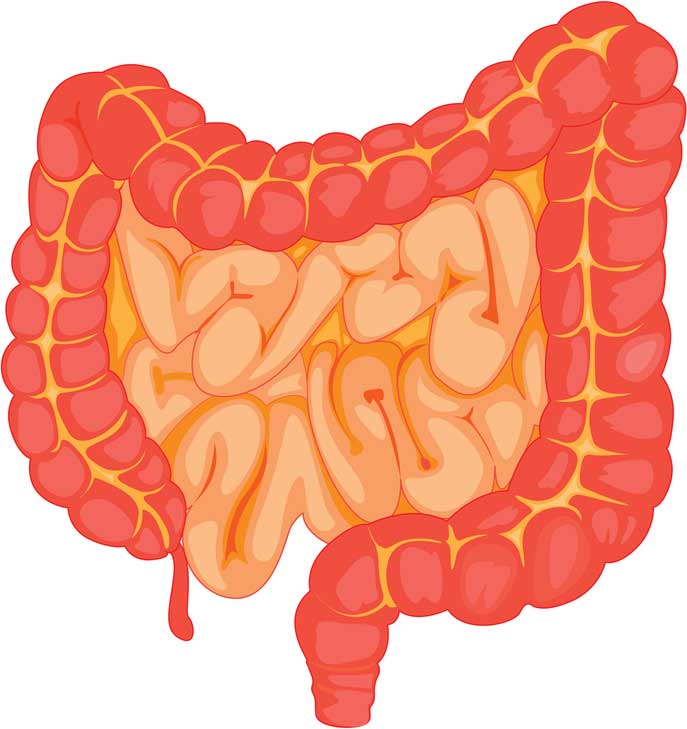
Constipation Treatment of spastic constipation at home
Rectal suppositories are a special form of medication for treating various diseases of the rectum and anus at home. It is the introduction of suppositories that allows you to quickly deliver medicinal substances directly to the site of the lesion, which significantly speeds up treatment.
In addition, almost all rectal suppositories contain fatty substances, which also provides a kind of laxative effect, significantly alleviating the patient’s condition.
Most often, when treating anal fissures, the patient is prescribed suppositories:
- Methyluracil . The action of these suppositories is aimed primarily at restoring damaged intestinal mucosa. Suppositories not only accelerate absorption processes, thanks to special active components, but also provide further protection against bleeding and inflammatory processes.
- Hepatrombin T. Suppositories are an effective drug that allows you to quickly eliminate inflammation, soothe pain and stop bleeding.
- Relief . These suppositories can be called the most famous and often prescribed for the treatment of anal fissures and hemorrhoids. The drug promotes rapid healing of injuries and also effectively eliminates inflammation, significantly alleviating the human condition.
- Ultraproct . The drug allows you to quickly reduce the level of vascular permeability, accelerates regeneration processes, and soothes such unpleasant symptoms as itching and burning.
Very often, anal fissures appear due to frequent constipation, so various laxatives are one of the main points of drug therapy. The use of such drugs allows you to unload the intestines, facilitates bowel movements and, due to this, accelerates the healing process.
All laxatives can be divided into several main groups:
- Irritant drugs.
- Preparations of osmotic action.
- Prebiotics.
- Enteric fillers.
Irritating drugs are considered the most effective , but if there are anal fissures, their use is prohibited. When treating this disease, in most cases, prebiotic drugs are used, which not only gently solve the problem of constipation, but also restore the balance of the intestinal flora, which also contributes to treatment.
It is very important to take into account all the features of the course of the disease and the general condition of the patient. The dosage of drugs is also determined by the doctor individually.
Often, when treating anal fissures at home, folk remedies are used, which are a harmless but very effective treatment option.
Many traditional medicine recipes for the treatment of such a disease can be prepared at home.
It may not be strange, but one of the most effective traditional medicines for the treatment of anal fissures are suppositories made from ordinary raw potatoes. To prepare them, you need to take a strong raw potato, peel it, cut a slice as thick as your little finger and cut out a regular-shaped rectal suppository from it.
Introduce suppositories before bedtime, lubricating them with sea buckthorn or rosehip oil before administration.
There is no need to worry that the injected potato suppository will get stuck in the intestines. In the morning it will pass freely along with the stool.
It is also recommended to use candles made from dandelion or plantain leaves. To prepare them, you should take a fresh leaf of the plant, wash it thoroughly, and dry it. Then tightly roll the leaf into a tube (the plantain leaf must be folded in half before doing this), dip it in sea buckthorn oil, let the excess drain off and immediately insert it into the anus.
prepared from strong decoctions of herbs such as chamomile, calendula flowers, tansy, yarrow, and oak bark are also used in treatment Herbs can be brewed and frozen individually or in groups. The cooled and strained broth for making ice candles can be poured into special molds of a suitable size or the little fingers of thin rubber gloves. Such suppositories should be administered at night, before bedtime.
An excellent remedy for treating anal fissures at home are sitz baths, which help prevent the appearance of suppuration at the site of damage to the mucous membranes, as well as eliminate inflammation and significantly reduce the intensity of pain.
This solution very quickly and effectively relieves spasms of the external anal sphincter, which reduces pain and speeds up healing due to increased blood circulation in this area.
The potassium permanganate solution should be weak and warm. Decoctions of medicinal herbs should also be used only warm. To prepare decoctions, it is recommended to use medicinal chamomile or calendula flowers, St. John's wort or yarrow.
The temperature of any solution, decoction or infusion for a sitz bath should not exceed 40 degrees. To carry out a bath, you will need at least 3 liters of medicinal solution, which must be poured into a basin of sufficient volume so that a person can sit in it.
Helps in the treatment of anal fissures and applying compresses of strong infusions of medicinal herbs, sea buckthorn or rosehip oil. To prepare such a remedy at home, you need to take clean gauze or a bandage, fold it in several layers, moisten it in the prepared medicine, squeeze it lightly and apply it tightly to the anus.
The compress should be kept for at least 30 minutes, while the patient should be in a supine position on his stomach and be relaxed.
They also make special compresses based on vegetables. For example, you should grate fresh beets and carrots on a fine grater and mix. Take 3 parts of the resulting mixture and add 1 part of fresh bull or pig bile to it. Mix thoroughly, then place the mixture on a prepared clean cloth or gauze and apply to the anus. Keep the compress for about 20 minutes.
In addition, for compresses you can use aloe juice and pulp, special ointments prepared independently from natural ingredients.
The most important problem with anal fissures is normal bowel movements, which cause severe pain and other uncomfortable symptoms. A person who has anal fissures must follow a special diet, the purpose of which is to facilitate this natural process of bowel movements and prevent constipation.
The daily menu must include plenty of fresh vegetables and fruits, as they contain fiber necessary for the normal functioning of the digestive system and prevent constipation. Fiber helps soften stool, making bowel movements easier.
The menu should also include bran. They can be added to porridges and baked goods, for example, when making bread. You should definitely include a variety of fermented milk products in your menu, primarily kefir and natural live yoghurts.
Dried fruits also have a laxative effect, preserving healthy fiber in large quantities. It is best to eat dried apricots, prunes or raisins.
You should eat often, but in small portions, so as not to create unnecessary stress on the digestive system. Overeating should not be allowed. Also, heavy and fatty foods, foods containing large amounts of protein, in particular legumes, should be excluded from the diet.
You should also avoid eating various semi-finished products, fast foods , carbonated and alcoholic drinks, dishes with a lot of spices and seasonings, salted and pickled foods, all kinds of smoked meats and sausages, avoid spicy foods, as well as cottage cheese, cheeses and eggs.
Of course, every person knows that any disease is much easier and better to prevent than to treat it and experience discomfort and pain. Anal fissures are no exception here, since with the help of some preventive measures you can avoid the appearance of such an unpleasant disease or prevent its recurrence after treatment.
It is very important to maintain sufficient physical activity, take daily walks or jogs, and lead a healthy lifestyle.
The second important point of prevention is maintaining proper nutrition, excluding or severely limiting the consumption of foods harmful to the digestive system. In this case, it is necessary to chew the food consumed thoroughly, since large pieces cannot be completely digested in the stomach and small intestine and are often excreted in an unprocessed form, thereby injuring the mucous membranes of the rectum and anus.
For this reason, in order to avoid problems with fully chewing foods, it is important to regularly visit the dentist and promptly treat your teeth if necessary.
source
As a rule, if there is no bowel movement for three days, constipation pain may appear. They can occur against the background of a stressful situation, during pregnancy, or with insufficient water intake. They are often provoked by medications, unhealthy diets, and sitting for a long time.
There are many factors that can cause pain in the anus. First, it’s worth understanding what constipation happens and why it occurs.
- Alimentary constipation develops due to lack of fluid. Then abdominal pain appears, and it becomes difficult to empty the intestines. My side also hurts;
- Hypokinetic. For those who spend a lot of time sitting. Occurs in people who are bedridden for various reasons;
- Reflex. Digestive problems affect. The most common type;
- Toxic. Occurs after intoxication and after long-term use of antibiotics;
- Endocrine. Appears against the background of a malfunction of the thyroid gland;
- Mechanical. This type of constipation involves swelling or scarring in the large intestine.
Listed above are the main culprits of constipation and pain that occurs due to difficulties with bowel movements. In addition, an unpleasant condition can provoke nervousness.
With constipation, a person feels a dull and throbbing pain. It becomes more intense if you push. Toxins accumulate in the intestines, from there they enter the blood vessels, and then into the brain. Receptors are affected and pain occurs. To normalize the condition, painkillers sometimes do not help. You need to reconsider your diet, supplement the menu with foods high in fiber. Enemas are recommended to cleanse the intestines.
Pain due to constipation is observed with low intestinal activity and zero gas discharge. Such spasms are strong and stabbing. They can also appear in pregnant women. This is dangerous, since tense abdominal muscles can cause miscarriage or the development of hemorrhoids.
Also, stagnation in the intestines can aggravate an already bad condition with colitis and fissures. To prevent this, you need to change your diet - more fruits, water.
The most negative and painful complication of constipation is hemorrhoids. If it becomes chronic, pain in the anus will become constant. In this situation, spasms in the anus can only be eliminated with an integrated approach.
To get rid of constipation, any person needs to improve their bowel function. The main driver of positive results is water. A common cause of difficulty passing stool is dehydration. Of course, it is advisable to drink liquid enriched with vitamins. Children can be given compotes and juices.
For example, you can prepare and eat vegetable salads after adding greens to them. Drink a large spoonful of sunflower oil, it thins the stool, making defecation easier. Vaseline oil is suitable for babies. It will not be absorbed, but will pave an easy path for food through the intestines.
You should not assume that enemas are done only during periods of exacerbation and in extreme cases. Prevention with this method of cleansing has long become the norm. As a rule, after the procedure you feel better and the pain goes away. With a one-time enema in 7 days, you can forget about constipation in adults for many years.
Of course, we should not forget about the internal state. It is recommended to avoid stressful situations. It is important to always control your emotions.
In addition to abdominal cramps, it is difficult to go to the toilet. In this case, you need to push hard or take medications that stimulate the waste of feces. Further, due to incomplete emptying, prolapse occurs in the perineum. It is important to know that with three bowel movements in a week, a person risks remaining with chronic constipation forever.
During defecation there is strong tension. The stools are dry and ball-shaped. In some cases, diarrhea occurs if the stomach is full.
During constipation, severe cramps and heaviness are felt in the lower abdomen. Relief comes after going to the toilet, where the gases are released. Against the background of gas formation, harmful organisms develop.
A patient with constipation faces problems such as:
- Belching;
- Unpleasant odor from the mouth;
- Poor appetite.
With chronic constipation, neurasthenic disorders, insomnia, and mood swings may occur. Due to regular and severe pain, it is important to monitor your diet and mood changes.
You can relieve constipation pain with the following medications:
- Ranitidine (more suitable for stomach cramps);
- No-shpa (quite a strong painkiller);
- Spasmalgon (quickly and gently relieves spasms).
Bisad, Stadalax and Bisacodyl are aimed at eliminating constipation, which tends to provoke pain not only in the abdomen, but also in the anus. Laxatives are also prescribed - Senadexin, Regulac. They cleanse the intestines with lightning speed and prevent side effects and addiction. The drugs begin to act 6 hours after taking the capsule or powder. In any case, time is given to come home.
Drugs such as Slabikal and Laxigal act on the colon and make bowel movements easier. The effect occurs after 8-10 hours. Not recommended for children under four years of age and pregnant women
Candles are also used, which are considered the most effective and mild. Use is allowed after a heart attack, during pregnancy and breastfeeding.
In a situation where the anus hurts due to constipation, it is important to be treated with “soft” medications. Self-medication is not allowed. You should also consult a specialist if the condition persists.
If you take laxatives without a doctor's recommendation, you may have problems with bowel movements in the future due to decreased motor function. It is imperative to identify the provoking factor and eliminate it.
It is important to remember about nutrition, it must be dietary. The menu should include cereals and fruits. It is recommended to drink more fluids, as excess gas may occur during the diet. In this case, Mucofalk is prescribed. When visiting a doctor, it is advisable to clarify the names of foods that can cause constipation.
You need to eat little by little, in small portions, but be sure to follow the regime. There should not be a long interval between meals. It won’t hurt, but will only benefit you from playing sports, swimming, gymnastics. An active lifestyle and the absence of stressful situations are the key to health.
In order to protect as much as possible from the difficulty of emptying and the associated consequences, it is necessary to promptly identify pathologies in the gastrointestinal tract.
source
The pain in the anus that occurs after constipation causes an unpleasant sensation due to the large accumulation of nerve endings in it. Pain from constipation occurs as a result of trauma to the rectum with solid feces, as well as ulcers, cracks and various pathological lesions, as well as thrombosis of hemorrhoidal cones. This problem cannot be ignored, therefore, in order to get rid of the pain of constipation, you need to treat the constipation itself by getting rid of the cause that caused it.
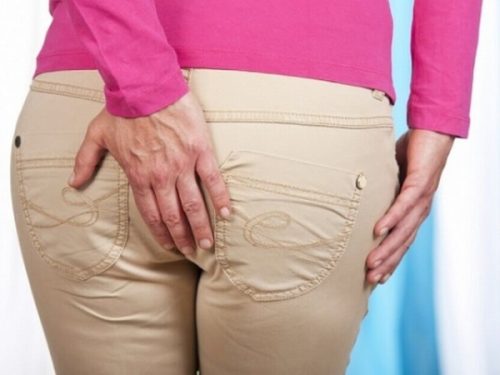
Constipation pain is one of the factors that causes a lot of trouble to a person. There are many other reasons for this unpleasant sensation associated with diseases of the rectum.
Factors influencing the occurrence of pain:
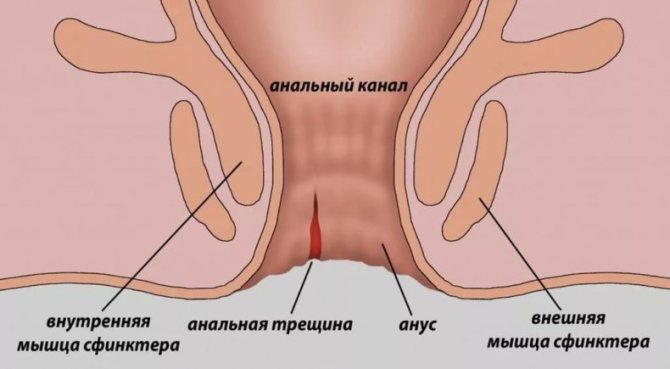
- Cracks in the anus, they can be caused by trauma. This can include hard feces or a foreign object, external lacerations during labor in women, or anal sex. A very strong burning pain occurs during the act of defecation, and scarlet blood may be found in the stool.
- Hemorrhoidal disorders bring pain not only during constipation, this is a consequence of complications of the disease and the development of thrombosis in the vessels of the rectum.
- As a concomitant process of the development of hemorrhoids or proctitis, an inflammatory process may occur in the sphincter itself, called sphincteritis.
- Inflammatory processes in the rectum, as well as abscesses in the submucosal area of the anus, can be the result of untreated cracks and injuries to its outer part.
- If there is no treatment for inflammation of the intestine and the resulting suppurations, then spontaneous opening of them occurs and the formation of fistulas, in which there will be not only pain, but also the presence of blood and pus in the stool.
- Perineal spasms can occur during adolescence. This phenomenon is accompanied by painful sensations.
- Prolapse of the rectum due to atrophic muscle damage.
- Bruises of the perineal area and coccyx bones.
- Infectious diseases of the genital organs.
- Helminthic infestations.
- Spasm or narrowing of the anus as a result of surgery.
- Irritable bowel syndrome.
- Cancerous tumors cause constant pain at a late stage of development and radiate to the lower back, genitals and perineum.
The doctor will also help you get rid of constipation, which responds well to treatment. This will improve the patient’s health and relieve general malaise, weakness and migraines.
Constipation pain can be divided into several types. They are classified according to the unpleasant sensations associated with the act of defecation and other pathological disorders in the body.
Constipation with such sensations leads to various disorders in the body.
Abdominal pain, sometimes radiating to the anus, can be caused by increased nervousness.
If a person’s stool has turned rusty or, conversely, has become tarry, and there is blood in the stool and pain after constipation in the anus, you need to consult a doctor. People who have relatives with malignant bowel diseases should not neglect this advice.
Next, an examination of the patient is scheduled to determine the cause and nature of the pain. If a child or adult complains that his butt hurts, the doctor examines the anus to identify cracks and damage.
Feces are tested for occult blood.
Next, treatment is carried out, and the identified pathology will be taken into account, so the doctor will individually prescribe for each patient:
- Antibacterial drugs.
- Hemostatic drugs.
- Vascular agents.
- Local and oral painkillers: these are ointments, suppositories and tablets.
- Laxatives for constipation in adults and children.
source
Treating constipation and eliminating discomfort
It is extremely difficult to accept such problems. And when faced with an illness, the question arises of what to do. Treatment will be based on eliminating the cause of constipation. Proper nutrition, plenty of fluids, a healthy and active lifestyle, and a calm environment are necessary. But sometimes it happens that following these rules does not give any result. Laxatives will come to the rescue. These include:
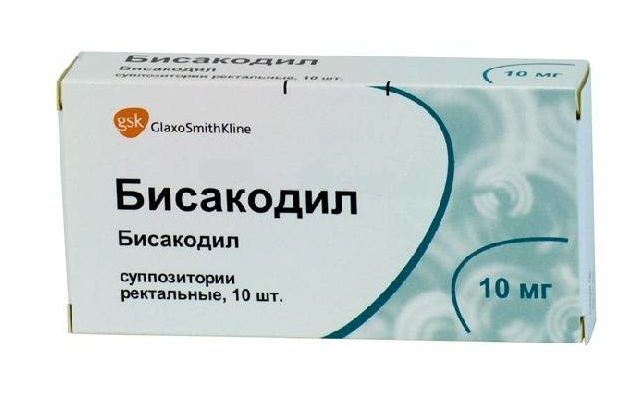
- Agents that irritate intestinal receptors (bisacodyl, senade, castor oil and others).
- Substances that can increase the amount of feces (flax seeds, agar-agar, lactulose).
- Preparations that soften stool (olive, sunflower, vaseline and other oils).
- Cleansing enema or microenema (microlax).
Several medications can be used to combat pain. For example, suppositories with an anesthetic that eliminate pain and also have an anti-inflammatory effect. In addition to suppositories, there are many ointments that have the same medicinal effects.
If, after constipation, a child’s bottom hurts greatly, then it is necessary to urgently show him to a gastroenterologist. There can be many reasons that cause pain, and only a specialist can accurately recognize and eliminate them.
The treatment mechanism for children and adults is slightly different. Children are prescribed special medications, the dosage of which is calculated with high accuracy.
Why does my stomach hurt after defecation?
The pain can be of different types (pulling, cutting, aching, prolonged, spasmodic) and occurs in the central, lower, lateral parts of the abdominal cavity or in the anorectal region.
It is not possible to make a diagnosis based on sensations. When emptying, the sphincter, abdominal and pelvic muscles tense, which puts pressure on the internal organs and, in the presence of pathologies, causes pain.
Such pathologies include:
- flatulence;
- helminthiasis;
- ulcerative colitis;
- Crohn's disease;
- appendicitis;
- ulcer;
- cancer of the lower digestive tract;
- paraproctitis;
- bruises of the coccyx and perineum.
Danger of constipation
Having problems with stool significantly worsens a person’s condition and quality of life. The anus may become sore during defecation. There is also a risk of developing other ailments, the treatment of which may take a long time:
- intestinal dysbiosis;
- general intoxication of the body, due to the accumulation of toxins in the body;
- haemorrhoids;
- inflammatory diseases;
- formation of polyps and cancer.
If there are signs of constipation, you should consult a doctor as soon as possible. Constipation may be temporary and may be associated with minor lifestyle changes. If there is no effect from general measures, more serious treatment is necessary.
Diseases in men
Since men have increased endurance and it is they who tend to endure pain and avoid visiting doctors, the following factors relate directly to men’s health.
Prostate inflammation
Since the prostate is located on the back wall of the intestine in close proximity to it, any pathological changes in its structure cause pain in the intestine itself. The most common disease is prostatitis, which is determined by the presence of an inflammatory process provoked by the presence of pathogenic microflora: ureaplasma, gonococci, E. coli, chlamydia.
Inflammation causes the prostate to enlarge in size, which puts significant pressure on the intestines.
The pain is acute, spastic, and intensifies when emptying the bladder and intestines. May be accompanied by additional symptoms:
- frequent urination;
- decreased sex drive;
- change in the nature of pain during erection;
- lack of orgasm;
- increase in body temperature.
The pain is localized in the lower abdomen, but can radiate to the perineum and sacrum, and also radiate to the thigh. In the chronic course, the pain is less intense, but appears much more often. The acute form is easier to cure, but its symptoms are much more pronounced.
Treatment consists of relieving pain, as well as reducing the inflammatory process in the prostate. For this, vasodilators and antispasmodics are widely used, which are combined with antibacterial agents.
Their choice depends solely on the results of a smear test for flora.
Haemorrhoids
This delicate problem most often affects the male population, especially those exposed to prolonged sitting: truck drivers, programmers, office and bank workers, machinists. When sitting for a long time on a flat surface, the pelvic floor experiences increased pressure. Stagnant processes form in the intestines, as natural blood flow slows down, reducing the rate of metabolic processes. If we add to this the lack of proper nutrition, obesity and a problem with blood vessels, then the clinical picture of hemorrhoids will not take long to appear.
Hemorrhoids are an inflammatory process of nodes that occurs when exposed to many factors.
It can be external and internal. In the first case, the nodes are located near the anus, in the second - directly in the intestines.
The pain is sharp, squeezing. Gives way to aching pain that occurs immediately after defecation. May be accompanied by symptoms such as:
- burning in the anal area;
- bloody discharge after bowel movements;
- the appearance of mucus in the stool;
- It hurts to sit and make sudden movements.
How to diagnose based on symptoms
Discomfort can be a manifestation of various ailments . Each disease and stage of its progression is characterized by certain painful sensations.
Soreness can be sharp and sudden, which indicates an acute stage of the disease, or vice versa - aching and inexpressive, which indicates a chronic type of pathology.
Reference. Certain characteristics of painful sensations will help the specialist make a preliminary diagnosis.
First, the doctor interviews the patient to determine the nature of the pain.
Treatment
After all the examinations have been carried out and an accurate diagnosis has been made, the specialist prescribes adequate treatment.
Reference. Depending on the type of pathology, conservative or surgical therapy may be prescribed.
Conservative treatment consists of selecting a set of medications that effectively eliminate inflammation and pain. The most commonly prescribed groups of drugs are:
- painkillers (“Ketorol”, “Nise”) - to relieve pain and improve general condition;
- rectal suppositories (“Relief”, “Proctosan”) - effectively cope with symptoms. Used for cracks and internal hemorrhoids;
- ointments (“Proctosedyl”, “Hepatrombin G”) - used for external hemorrhoids;
- venotonics (“Venarus”, “Detralex”) - often prescribed to strengthen and tone venous vessels;
- hemostatic drugs (Vikasol) - used for severe bleeding.
These drugs can effectively cope with pain and inflammation
If the anus hurts after constipation, then the doctor recommends following a diet designed to improve digestion and the process of bowel movement.
If the diet does not have the desired effect, then laxatives are prescribed (Bisacodyl, Senadexin, Guttalax, Microlax).
If the anus hurts after diarrhea, then first of all it is necessary to stop the diarrhea with the help of special medications (Smecta, Loperamide). Since diarrhea is a disorder of the digestive system caused by food, infections or stressful situations, further treatment depends on the provoking factor.
In cases of ineffectiveness of conservative methods, specialists resort to surgical intervention.
Some pathologies require surgery
As usual, pain in the anus after defecation is treated through surgery in the following situations:
- Paraproctitis.
- Fistula.
- Anal fissures, if medications are ineffective.
- Thrombosis of hemorrhoids.
- Rectal prolapse.
The surgery itself does not take much time, but the recovery period can last quite a long time.
Therefore, treatment should be started as early as possible, because this way you can prevent the progression of pathology and the development of complications.

